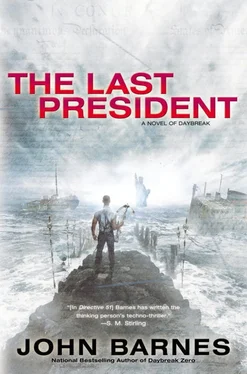The man raising a hatchet was being pushed over backwards by Jebby’s spear in his throat. Highbotham swept his foot, stepped forward, and chopped between his eyes. Her wrists ached; those had been some forceful shocks.
Henry was at her feet, Jebby at her side, the rest of her squads and the survivors from Henry’s Squad Three in a cluster around her. Looking down the slope, she saw the last tribal bowmen fleeing toward the wall. As a space opened between friend and foe, crossbow bolts whizzed after the few surviving raiders, bringing several down.
Henry better live. I owe him props on the crossbows. They were his idea, from that Nantucket book he was always talking about. Is always talking about.
Highbotham ordered, “Crossbowmen, cover us, everyone else, carry the wounded, back to the center pit. Two runners!”
Two survivors from Henry’s team stepped forward. “You, go to Squads One and Two. You, Four and Five. Let Gilead know he’s in command now, and Squad Ten will hold the center pit. Bartie commands Squad Ten and he’s Gilead’s second in command. Tell them this is an order: No one is to rush the fence or try to carry the attack beyond it. Hold this side of the fence till the town militia relieves us. Do not charge into the enemy like some crazy-ass hero. Repeat that.”
They did, crazy-ass hero and all. She nodded, and the runners were off across the thick lawn.
“My fault,” Henry said, as two boys lifted him from the ground at her feet. “Bombs didn’t—”
“Rest,” she said. “And your crossbows are great .” A few more steps brought them back to the center firing pit. “Anyone left from Squad Three—”
“Sorry—”
“Shut up , Henry. I said rest . Squad Three survivors, you’re in Squad Ten, under Bartie’s orders, now. Bartie, hold the center pit for me, and you’re Gilead’s second in command for the whole force.”
Whooshes and booms resounded from the sea side of the big house; flashes of light flickered behind the low rise. “Squads Nine and Eleven, back to the rally point and we’ll probably keep running when we get there.”
It was not a long run—back before, a high school runner would have called it “middle distance”—and they were warmed up and well into second wind, so it seemed to Highbotham that she and her little force almost flew up the hill and onto the patio. Abby had just signaled, and squads Twelve and Thirteen were running down to the beach ahead of them.
They put on a burst of speed and caught up, racing into well-rehearsed positions on the first rise above the water, between the rocket squads and the incoming boats. “Everyone down! Prone firing position!”
The force lay down instantly, wriggling forward, weapons pointed down the beach, checking mechanisms and laying out ammunition within easy reach without being ordered to.
Highbotham stayed on her feet to look the situation over. Rockets had set the lead boat on fire, but most of its crew had made it to shore; the other two were just landing, and already there were almost as many raiders as defenders. Three more boats had already rounded the point.
The voice of a long-ago instructor echoed in her head: The first rule of repelling invasions is act now , because it won’t get better. If you screw that one up, there is no second rule.
Highbotham turned and shouted to Abby and Richard behind her. “Three-rocket volley into their landing! Then concentrate on the ones further out!”
Abby and Richard were yelling to their squads as Highbotham spoke quietly. “Squads Nine, Eleven, Twelve, and Thirteen, form up. Make sure you’re reloaded. Stay down till the rockets go over, then we’re going to rush them. Be ready.” She stretched out prone. Her hands busied themselves reloading her revolver. She had just pushed the last paper cartridge in, topped it with a percussion cap, and swung the cylinder back into place when three roars of thunder overlapped scant yards above them, the white glare lighting the beach like an old-time flashbulb.
“Now!”
She felt more than saw two dozen CAM kids jump up and race forward with her. The tail flames of the three rockets shot out beyond them, wobbling and spiraling like footballs through the 200 yards.
In less than two seconds, one rocket augured into the sand about 20 feet short, exploding in a big burst that sprayed the raiders with grit and gravel but hurt them very little. The second bent upward, tumbled, and sailed out over the water.
The third hit a jackpot. Before the Daybreakers had recovered from the blinding explosion and spray of gravel, the lucky rocket’s short fuse set off its 15 pounds of crude dynamite less than 10 feet off the ground, directly above the main body of Daybreakers. The rocket had flown only a fifth of its normal range, so the dynamite set off most of the fuel—a saltpeter/tallow/powdered-aluminum slurry—in a fireball 50 feet across, which flared and went black in the time of one gasp. The reeling, groping figures emerged from it with clothes and hair on fire where blazing tallow clung to them.
“Follow me!” Highbotham and her reserve squads raced down the beach. Some of the Daybreakers dove into the water, extinguishing the flames, but exposing themselves to bullets and bolts when they stood. Others ran screaming, to be run down and chopped, stabbed, or clubbed, as the islanders drove all the way to the water’s edge in that first charge.
It was victory for the moment, but the additional three longboats were now close enough for a bowman in the lead one to launch inaccurate, wobbly arrows onto the shore. Abby’s voice carried on the wind behind them. “Everybody down!”
“Down!” Highbotham echoed, and dove onto the sand. All around her she could hear the kids doing the same. Three more rockets roared over them. The beach and sea were briefly brighter than day.
One splashed to extinction without detonating. One burst early, scattering blobs of burning tallow onto the water. The last lost a fin, looped once, and fizzled into brief pathetic fire as it fell harmlessly into the sea. The Daybreakers cheered, rowing as hard as they could, much closer, now, because the rockets had taken up time when snipers might have been working.
“Crossbowmen and riflemen,” Highbotham said, “pick one target—a helmsman or a bowman—and on my count of three, take one real good shot. Squads Nine and Eleven, as soon as those shots are fired, move back into a line fifty yards back. Twelve and Thirteen, fifty yards behind the first line. Backwards leapfrog, like in drills; we’ve got to give the rocketeers time to reload. All right, on—”
A boom! shockingly loud and close.
Highbotham looked and laughed, a little madly. “Belay all that! Pick targets and fire at will, we’re winning.”
Cuppa Joe , under full sail in the light land breeze, was sailing into Punnett Bay; a shot from her bow chaser had capsized the longboat nearest shore. The cannon boomed again, making a big splash in front of the next boat, which then veered when a crossbow bolt struck the steersman in the face, knocking him backwards into the sea. Another shot from Cuppa Joe holed the boat, sinking it in seconds.
The last boat was pulling south, either running away or trying for a flank attack. Cuppa Joe fired again, capsizing it.
As heads bobbed up in the bay, crossbowmen began picking them off. We really should talk about taking prisoners, soon.
Morse blinked from the stern of Cuppa Joe ; it wasn’t encrypted, so Highbotham and everyone read it together. TOWN MILITIA ARRIVING. CJ PROCEEDING COAKLEY. GOOD HUNTING.
Highbotham walked slowly back up the beach. The sounds from the landward side were no longer of battle but of rout. The absence of chanting and drums, and the rhythm of volley fire, told her that the Daybreakers who had overstayed were trapped between the fence and the town militia.
Читать дальше












